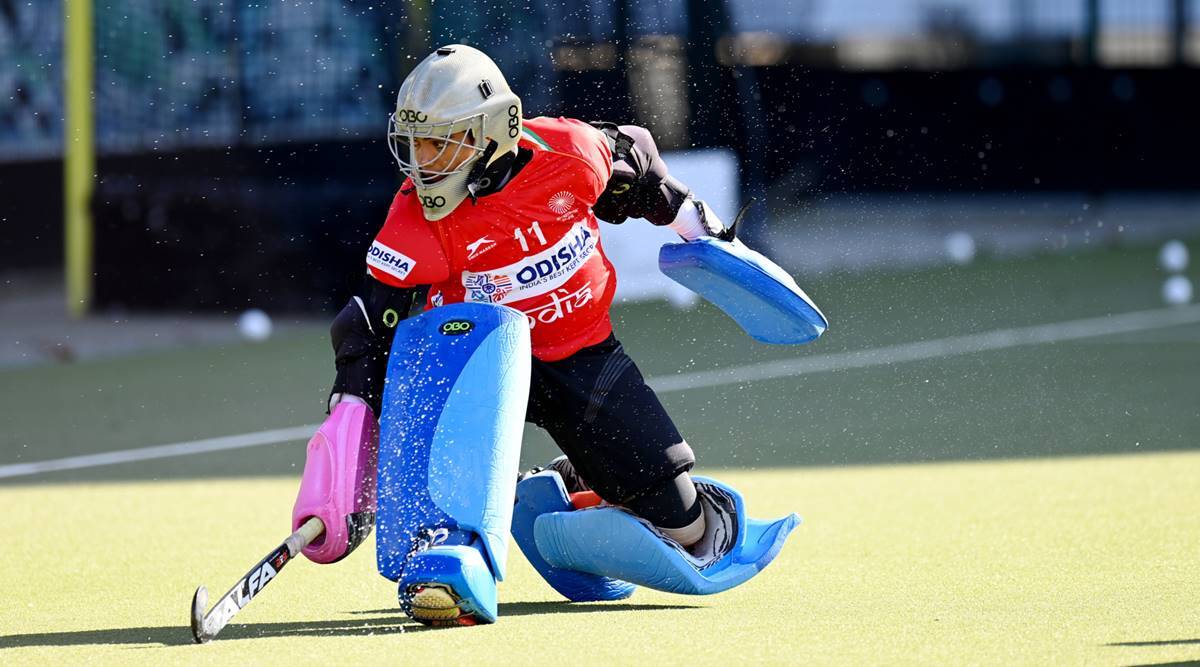Team, minus an injured skipper Rani Rampal, will play Asia Cup opener against Malaysia on Friday
Thank you for reading this post, don't forget to subscribe!Shared News: January 21, 2022 8:11:33 am
Asia Cup will mark the beginning of a busy 2022 for the defending champions. (Hockey India)
In theory, this isn’t a return to the hockey field after the Olympics but for all practical reasons, when India’s women’s hockey team plays against Malaysia in the Asia Cup on Friday, it will be their first tournament since the path-breaking campaign at the Tokyo Olympics.
Last month, India travelled to South Korea for the Asian Champions Trophy. The team began its new cycle with a resounding 13-0 win over lowly Thailand. But after a Covid-19 case in the group, the rest of the players were forced to spend the remainder of their time inside the hotel, resulting in them withdrawing from the competition. Coach Janneke Schopman, who called that experience a ‘scarring’ one, will be hoping the Asia Cup, being held in Muscat, will be a smooth ride on that front. With a World Cup spot at stake, the team will not be able to afford to sit out from this one.
In hindsight, the Asia Cup is where the turnaround well and truly began for India. In 2017, they became the champions and qualified for the 2018 World Cup, where they came agonisingly close to qualifying for the semifinals for the first time ever. They took that confidence into the Asian Games, where they won the silver, went on to qualify for the Olympics (it was the first time they made the cut for back-to-back editions) where they finished fourth.
Start of a busy cycle
Now, as the new season gets underway, the Asia Cup will mark the beginning of a busy 2022 for the defending champions, who have been starved for competition. Three days after the Asia Cup ends, India will make its FIH Pro League debut against China (in Muscat, presumably because of the travelling restrictions caused by the pandemic) on January 31.
The Pro League concludes on June 22 and on July 1, the World Cup – India will have to finish in the top four at the Asian Cup to qualify for it – will get underway in the Netherlands and Spain. Less than two weeks after the World Cup concludes, the team will be off to Birmingham for the Commonwealth Games and a month later, they’ll be in Hangzhou for the Asian Games, where a berth for the Paris Games will be up for grabs.

India’s women’s hockey team plays against Malaysia in the Asia Cup.
For Schopman, who was the team’s analytical coach at the Tokyo Games, the two continental tournaments at the start and the end of the season – Asia Cup and Asian Games – will be critical in terms of qualifying for the two biggest events, the World Cup and the Paris Olympics, respectively. And both sets of events are interlinked – the Asia Cup will give a glimpse into how well can the team do at the Asian Games; and the World Cup often gives an indication of the team’s readiness for the Olympics.
Same philosophy Schopman isn’t looking to deviate from the playing philosophy instilled by former coach Sjoerd Marijne. Under Marijne, the team had remarkably improved its fitness, which enabled them to play fast-paced give-and-go hockey. This enabled the team to exceed expectations at the Olympics, but Schopman is conscious about the reality, and the steps that need to be taken to build on the Tokyo show.
“If we look at the stats from the games, we still have some gains to make to be in the top six of the world,” she said before leaving for Muscat. “I think from the Olympics we’ve got that belief that we have a place at the top of world hockey. But we need to improve and need to keep improving.”
The team, during their camp in Bangalore, has focussed on their off-the-ball movements. Schopman wants the players to be strong when they have possession and create more scoring opportunities, but at the same time, keep the defence tight. Many times in the past, this balance had been lacking.
It helps that Schopman has been with the team for close to three years now. But the rest of the coaching staff has changed; most importantly, the team’s strength and conditioning coach Wayne Lombard. The South African was credited with turning around the fitness of the players. But he quit after the Olympics and has been replaced by compatriot Taren Naidoo, who has worked with him in the past.

India had a camp in Bangalore.
The playing group, more or less, remains stable although captain Rani Rampal, who is recovering from an injury, has not travelled with the group. Goalkeeper Savita Punia will be leading the team, who seem to be relishing the pressure of expectations on them. “They (the players) want to be right there with the other teams on the top,” Schopman says. “They don’t want to be one-day wonders.”
Menezes in the Japanese corner
There will be an Indian interest elsewhere, too. Former India goalkeeper Jude Menezes is now the coach of Asian Games gold medalists Japan, who are in the same group as India at the Asia Cup. In his long career as a coach with the New Zealand women’s team, Menezes was largely in charge of the defensive players and the goalkeepers and had been an integral part of the coaching staff at the Rio and Tokyo Olympics.
With Japan, he made an instant impact, winning the Asian Champions Trophy last month in his maiden assignment with the team. While that was a watered-down event due to the Covid outbreak among teams, Menezes will be hoping to repeat the performance this week. His team, in fact, could also be the biggest hurdle for India to clear.




